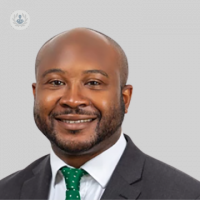Testicular pain: What to know
Written in association with:Testicular pain can be a sign of various issues and requires immediate medical attention. In this informative guide, highly respected consultant urological surgeon Mr Nkwam Micheal Nkwam shares a key case in point of what to do when testicular pain occurs and explains the importance of seeing a doctor promptly.

Can testicular pain be a sign of something serious?
It has always been well-documented that finding cancers earlier improves the likelihood of cure so seeing your doctor quickly if you have blood in your urine for example, is always the right thing to do. But what about testicular pain?
As we say in the trade, "Time is testicle!", so make sure you seek urgent medical attention as soon as possible! Although testicular cancer can present with a painful testicle it is far from the most likely cause. The most important diagnosis to rule out is twisting of the testicle on its cord - this is called testicular torsion.
A case in point: What to do when testicular pain strikes
It is 3pm on Monday afternoon and 14-year-old Johnny is in the middle of his favourite session of double maths at school when all of a sudden, he develops a severe pain in his right testicle (although either testicle can be affected). He is sent to see the school nurse for review. The pain gets worse and the nurse quite sensibly advises he be sent to A&E immediately to review. Johnny’s parents are informed and come to pick him up within the hour to take him to the nearest hospital.
It is now 4:30pm and Johnny is seen straight away by the urology team. There is no history of injury to testicle for example, while playing sport, and Johnny had been totally well all week with nothing to suggest a urine infection either. His testicle was still painful but now also red and swollen so the doctors explained to Johnny and his parents that they are concerned this may be a case of testicular torsion! There is no scan which can tell doctors one hundred per cent that there is no torsion - so the only way to confirm the diagnosis and treat it in one go is with immediate surgical exploration in theatre.
“Time is testicle”
Testicular torsion occurs when the testis rotates on its cord cutting off the blood supply to the testis – this is a medical emergency.
Truth be told, testicular torsion can occur at any age but is most common between the ages of 12 and 18 years. If left twisted, the testicle will eventually die but if it is untwisted, it can be brought back to life and this is time-dependent. Over 80 per cent of testes are saved when the testis is untwisted within 6 hours of the onset of pain. However, the salvage rate falls to about 50 per cent at 10 hours, 10 per cent at 12 hours and a lowly 5 per cent or less at 24 hours. Hence, the saying “time is testicle!”
What about Johnny?
Luckily for Johnny, he got to theatre 2 hours after his pain started and his testicle was twisted. So, the surgeons untwisted it thus saving the testicle and put stitches in as well to stop it from happening again. For good measure his other testicle was also stitched to prevent the same. Both Johnny and his testicles went on to make a full recovery and he was back in double maths again the following week!
The take home message is; in the event of sudden onset testicular pain make sure you seek medical attention immediately.
Mr Nkwam Micheal Nkwam is one of the UK’s leading consultant urological surgeons. To schedule a consultation with Mr Nkwam, visit his Top Doctors profile today.


